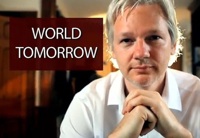2012-05-23 "The World Tomorrow": "High quality" pirate programming to fight the rising propaganda wave?
 Initially excoriated by mainstream media sources, Julian Assange's TV show, "The World Tomorrow," is now being hailed as the leading edge of a new era of "high quality alternative" broadcasting. The show's influence may become even more important, as two U.S. senators seek to overturn a longstanding ban on using the media for pro-government propaganda.
Initially excoriated by mainstream media sources, Julian Assange's TV show, "The World Tomorrow," is now being hailed as the leading edge of a new era of "high quality alternative" broadcasting. The show's influence may become even more important, as two U.S. senators seek to overturn a longstanding ban on using the media for pro-government propaganda.
From zero to hero
In the immediate, critical fury that followed its April debut, The New York Times opined that "The World Tomorrow" -- the new TV program produced by WikiLeaks leader Julian Assange (whom the Times characterized as a "nut job") -- was "unlikely to win high ratings or change many minds." Forbes dismissed the show as an overly-placating snoozefest, while The Guardian called Assange a "useful idiot". (All of this came as no surprise by Assange, who -- having anticipated the outrage that his small-screen foray would inspire -- had already drafted a list of prefabricated smears and published them for his detractors to use.)
Now, however, that six of the show's twelve episodes have aired, some media voices are starting to show their admiration for the firebrand publisher's latest enterprise. In one article from last week, BBC commentator Jamillah Knowles described "The World Tomorrow" as "high quality alternative programming"; while Salon journalist Glenn Greenwald lauded Assange for "fulfilling the key journalistic functions of airing otherwise suppressed perspectives, highlighting highly consequential issues that are otherwise ignored, and shining a light on the world’s most powerful political factions." Initially distributed online by Russia Today (RT), "The World Tomorrow" has, meanwhile, been picked up by other stations.
Knowles praises Assange's directness, easy "camaraderie" with his guests, and ability to attract such notables as Hezbollah head Hassan Nasrallah; new Tunisian President Moncef Marzouki; Arab Spring ringleaders Alaa Abd El-Fattah and Nabeel Rajab; former Guantanamo detainee Moazzam Begg; and Ecuador President Rafeal Correa. Musing on the program's place within "future pirate TV," Knowles also lauds "The World Tomorrow" for its production quality and innovations. One such novelty includes Assange's decision to release the complete transcripts and notes from each episode, comprising hours of material that did and didn't make the final cut. As Knowles comments: "These notes in themselves are pretty interesting as they show the relationship between the participants more clearly than the broadcast edits manage to." Moreover, she states, Assange's approach demonstrates "a certain understanding of the web that mainstream media may yet have to grasp."
Pirates to fight a new wave of propaganda?
"So," Knowles asks, "are we ready for other contentious figures to broadcast their own shows online when they are not prepared to play by the rules of existing media companies?"
It's a question that this week promised to become ever more salient, as news media sources revealed that, during talks on the National Defense Authorization Act for Fiscal Year 2013 (NDAA), U.S. Congressmen Mac Thornberry and Adam Smith introduced the “Smith-Mundt Modernization Act of 2012" (H.R. 5736). This amendment would reverse long-standing U.S. law that currently prohibits the use of psychological operations (PSYOP) and the distribution of pro-government propaganda within U.S. borders.
Allegedly intended to counter anti-U.S. internet campaigns by al-Qaeda and other "radicals," the proposed legislation would allow the U.S. State Department and the Broadcasting Board of Governors to “prepare, disseminate and use public diplomacy information” both overseas and at home. For decades, federal law has permitted PSYOP use overseas, but banned it domestically. The Smith-Mundt Act could change that, and permit the federal government to use U.S. mainstream media sources as uncritical mouthpieces. In response, RT muses, "Does that mean that the anti-Nazi and damning communism adverts that were a hallmark of America during the Second World War and the Cold War, respectively, will be updated to outrage Americans against the country’s alleged enemies?"
Whatever the answer to that question, the market for such "high quality alternative TV" as Assange's "The World Tomorrow" may soon increase, as 21st-century viewers -- more sophisticated than their 1950s counterparts -- tire of mainstream media manipulation and turn increasingly toward other sources for news and information.